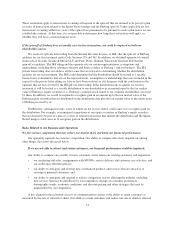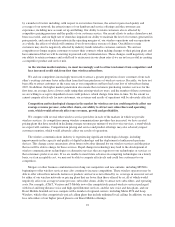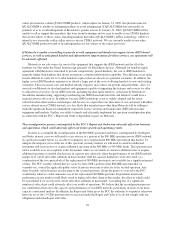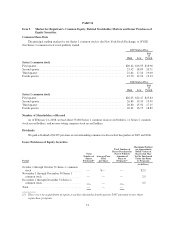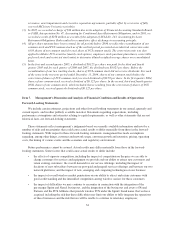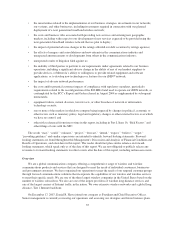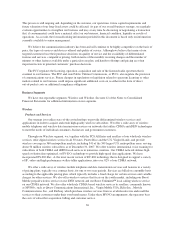Sprint - Nextel 2007 Annual Report Download - page 28
Download and view the complete annual report
Please find page 28 of the 2007 Sprint - Nextel annual report below. You can navigate through the pages in the report by either clicking on the pages listed below, or by using the keyword search tool below to find specific information within the annual report.sunset provision for certain QUALCOMM products, which expires on January 31, 2009, that provides time for
QUALCOMM to modify its infringing products to avoid infringement. If QUALCOMM does not modify its
products so as to avoid infringement of Broadcom’s patents at issue by January 31, 2009, QUALCOMM will be
unable to sell or support those products that were found to infringe and we may be unable to use CDMA handsets
that are the subject of these claims, including handsets that utilize QUALCOMM’s QChat technology, which we
intend to use to provide walkie-talkie services on our CDMA network. We are currently unable to use other
QUALCOMM products found to be infringing that are not subject to the sunset provision.
If Motorola is unable or unwilling to provide us with equipment and handsets in support of our iDEN-based
services, as well as anticipated handset and infrastructure improvements for those services, our operations will
be adversely affected.
Motorola is our sole source for most of the equipment that supports the iDEN network and for all of the
handsets we offer under the Nextel brand except primarily for BlackBerry devices. Although our handset supply
agreement with Motorola is structured to provide competitively- priced handsets, the cost of iDEN handsets is
generally higher than handsets that do not incorporate a similar multi-function capability. This difference may make
it more difficult or costly for us to offer handsets at prices that are attractive to potential customers. In addition, the
higher cost of iDEN handsets requires us to absorb a larger part of the cost of offering handsets to new and existing
customers. These increased costs and handset subsidy expenses may reduce our growth and profitability. Also, we
must rely on Motorola to develop handsets and equipment capable of supporting the features and services we offer
to subscribers of services on our iDEN network, including the dual-mode handsets. A decision by Motorola to
discontinue manufacturing, supporting or enhancing our iDEN-based infrastructure and handsets would have a
material adverse effect on us. In addition, because iDEN technology is not as widely adopted and has fewer
subscribers than other wireless technologies and because we expect that over time more of our customers will utilize
service offered on our CDMA network, it is less likely that manufacturers other than Motorola will be willing to
make the significant financial commitment required to license, develop and manufacture iDEN infrastructure
equipment and handsets. Further, our ability to timely and efficiently implement the spectrum reconfiguration plan
in connection with the FCC’s Report and Order is dependent, in part, on Motorola.
The reconfiguration process contemplated by the FCC’s Report and Order may adversely affect our business
and operations, which could adversely affect our future growth and operating results.
In order to accomplish the reconfiguration of the 800 MHz spectrum band that is contemplated by the Report
and Order, in most cases we will need to cease our use of a portion of the 800 MHz spectrum on our iDEN network
in a particular market before we are able to commence use of replacement 800 MHz spectrum in that market. To
mitigate the temporary loss of the use of this spectrum, in many markets we will need to construct additional
transmitter and receiver sites or acquire additional spectrum in the 800 MHz or 900 MHz bands. This spectrum may
not be available to us on acceptable terms. In markets where we are unable to construct additional sites or acquire
additional spectrum as needed, the decrease in capacity may adversely affect the performance of our iDEN network,
require us to curtail subscriber additions in those markets until the capacity limitation can be alleviated, or a
combination of the two, particularly if the replacement of 800 MHz spectrum is not available for a significant period
of time. The FCC recently ordered that we vacate by June 2008 a portion of the 800 MHz spectrum that we
currently use, even if the applicable public safety licensee is not ready to relocate to the vacated spectrum. Any
delay by public safety licensees in relocating to the vacated spectrum, absent the grant of a waiver by the FCC,
would delay when we could commence use of the replacement 800 MHz spectrum. Degradation in network
performance in any market would likely result in higher subscriber churn in that market, the effect of which could
be exacerbated if we are forced to curtail subscriber additions in that market. A resulting loss of a significant
number of subscribers could adversely affect our results of operations. We believe that the reconfiguration process
has contributed adversely to the capacity and performance of our iDEN network, particularly in some of our more
capacity constrained markets. In addition, the Report and Order gives the FCC the authority to suspend or otherwise
limit our use of the 1.9 GHz spectrum that we received under the Report and Order if we do not comply with our
obligations under the Report and Order.
26







